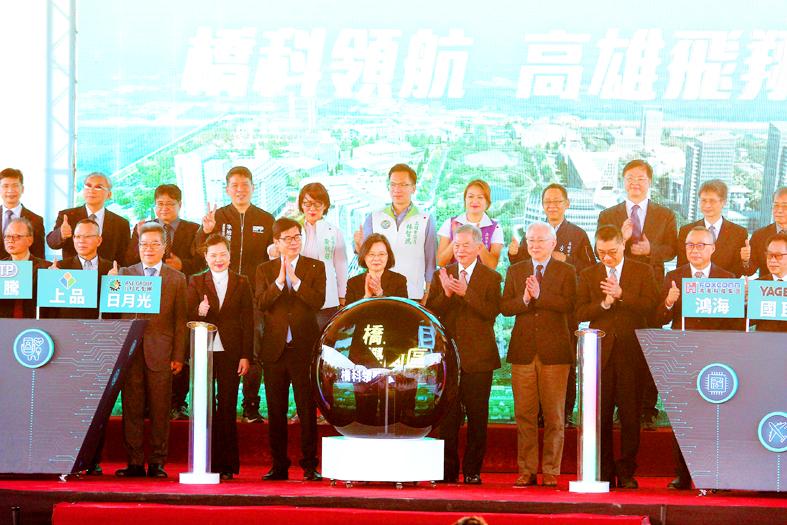Technology is the nation’s security guarantee, President Tsai Ing-wen (蔡英文) said yesterday, expressing the hope to make the world “more reliant on Taiwan.”
Tsai made the remarks during visits to the Ministry of Science and Technology’s Cyber Security and Smart Technology R&D Building in Tainan and a planned science park in Kaohsiung’s Ciaotou District (橋頭).
The cybersecurity building in Gueiren District (歸仁) houses 14 cybersecurity firms and the southern branch of the ministry’s start-up incubator Taiwan Tech Arena. The building is part of the wider Shalun Smart Green Energy Science City.

Photo: Lee Hui-chou, Taipei Times
“The world is watching Taiwan, especially its technology development,” Tsai said, adding that the nation has to speed up innovation.
Taiwan’s advanced technology and manufacturing prowess is critical to its survival and security, she said, adding that Taiwanese technology would help the nation create closer links with the world.
New high-tech industry clusters would be set up not only in northern and central Taiwan, but also in the south, she said.
“Taiwan would become the world’s biggest tech cluster,” she added.
Few people wanted to move for work to Gueiren five years ago, but the hub in the district is expected to become the cradle of Asia’s most advanced cybersecurity technology, featuring innovative start-ups, Minister of Science and Technology Wu Tsung-tsong (吳政忠) said.
A cybersecurity base managed by the ministry-affiliated National Applied Research Laboratories is on the building’s fifth floor.
The base is tasked with cultivating cybersecurity talent and promoting academia-industry cooperation, said Steven Tsai (蔡一郎), a researcher at the cybersecurity hub.
Since the COVID-19 pandemic started, businesses have increasingly adopted remote operations and placed increasing emphasis on ID certification, driving the need for cybersecurity defenses, he said.
Connected to the facilities of the National Center for High-Performance Computing, the cybersecurity base would regularly stage cyberattack and defense drills, he said.
One of the firms stationed in the new building, Systex Solutions Corp (精誠資訊), considers the new space appealing due to its proximity to the Southern Taiwan Science Park (南部科學園區), Systex operation and service division technical manager Erin Chang (張莉婷) said.
With more firms returning to Taiwan, the region is expected to attract more new businesses, she said.
Systex, which offers cybersecurity solutions, hopes to gain many clients among those firms, she added.
The Ciaotou Science Park (橋頭科學園區), which is under construction, is seeking to recruit businesses in the semiconductor, electric vehicle, and information and communications technology sectors, Southern Science Park Administration Bureau director-general Su Chen-kang (蘇振綱) said.
The planned science park would cover 352.44 hectares, including 186.49 hectares of industrial zones, 39.79 hectares of residential and commercial zones and 126.16 hectares of green land.
The park’s development plan was approved by the Environmental Protection Administration in September.
Kaohsiung Mayor Chen Chi-mai (陳其邁) said the city government would provide full assistance to businesses that seek to set up bases in the new science park, including on meeting water and electricity demand.

Right-wing political scientist Laura Fernandez on Sunday won Costa Rica’s presidential election by a landslide, after promising to crack down on rising violence linked to the cocaine trade. Fernandez’s nearest rival, economist Alvaro Ramos, conceded defeat as results showed the ruling party far exceeding the threshold of 40 percent needed to avoid a runoff. With 94 percent of polling stations counted, the political heir of outgoing Costa Rican President Rodrigo Chaves had captured 48.3 percent of the vote compared with Ramos’ 33.4 percent, the Supreme Electoral Tribunal said. As soon as the first results were announced, members of Fernandez’s Sovereign People’s Party

MORE RESPONSIBILITY: Draftees would be expected to fight alongside professional soldiers, likely requiring the transformation of some training brigades into combat units The armed forces are to start incorporating new conscripts into combined arms brigades this year to enhance combat readiness, the Executive Yuan’s latest policy report said. The new policy would affect Taiwanese men entering the military for their compulsory service, which was extended to one year under reforms by then-president Tsai Ing-wen (蔡英文) in 2022. The conscripts would be trained to operate machine guns, uncrewed aerial vehicles, anti-tank guided missile launchers and Stinger air defense systems, the report said, adding that the basic training would be lengthened to eight weeks. After basic training, conscripts would be sorted into infantry battalions that would take

GROWING AMBITIONS: The scale and tempo of the operations show that the Strait has become the core theater for China to expand its security interests, the report said Chinese military aircraft incursions around Taiwan have surged nearly 15-fold over the past five years, according to a report released yesterday by the Democratic Progressive Party’s (DPP) Department of China Affairs. Sorties in the Taiwan Strait were previously irregular, totaling 380 in 2020, but have since evolved into routine operations, the report showed. “This demonstrates that the Taiwan Strait has become both the starting point and testing ground for Beijing’s expansionist ambitions,” it said. Driven by military expansionism, China is systematically pursuing actions aimed at altering the regional “status quo,” the department said, adding that Taiwan represents the most critical link in China’s

‘REALLY PROUD’: Nvidia would not be possible without Taiwan, Huang said, adding that TSMC would be increasing its capacity by 100 percent Nvidia Corp CEO Jensen Huang (黃仁勳) on Saturday praised and lightly cajoled his major Taiwanese suppliers to produce more to help power strong demand for artificial intelligence (AI), capping a visit to the country of his birth, where he has been mobbed by adoring fans at every step. Speaking at an impromptu press conference in the rain outside a Taipei restaurant, where he had hosted suppliers for a “trillion-dollar dinner,” named after the market capitalization of those firms attending, Huang said this would be another good year for business. “TSMC needs to work very hard this year because I need a lot